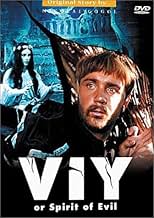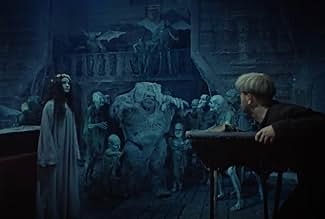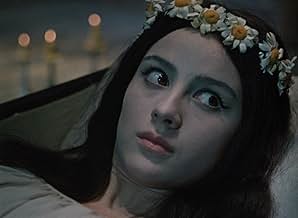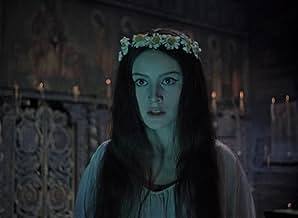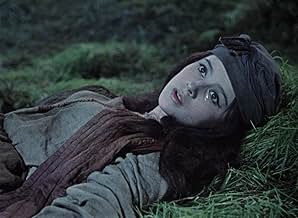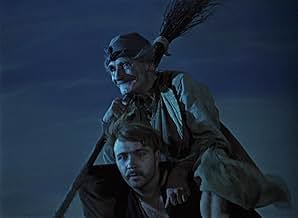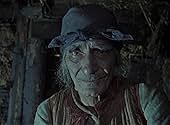Viy
- 1967
- Tous publics
- 1h 17min
NOTE IMDb
7,2/10
11 k
MA NOTE
Un jeune prêtre reçoit l'ordre de veiller une sorcière, dans la petite église en bois d'un hameau isolé. Il devra pour cela passer trois nuits seul avec le cadavre, avec sa foi pour unique p... Tout lireUn jeune prêtre reçoit l'ordre de veiller une sorcière, dans la petite église en bois d'un hameau isolé. Il devra pour cela passer trois nuits seul avec le cadavre, avec sa foi pour unique protection.Un jeune prêtre reçoit l'ordre de veiller une sorcière, dans la petite église en bois d'un hameau isolé. Il devra pour cela passer trois nuits seul avec le cadavre, avec sa foi pour unique protection.
- Réalisation
- Scénario
- Casting principal
Natalya Varley
- Pannochka
- (as N. Varley)
Aleksey Glazyrin
- Sotnik
- (as A. Glazyrin)
Nikolay Kutuzov
- Witch
- (as N. Kutuzov)
Vadim Zakharchenko
- Khalyava
- (as V. Zakharchenko)
Pyotr Vesklyarov
- Prncipal of the Seminary
- (as P. Vesklyarov)
- …
Vladimir Salnikov
- Gorobets
- (as V. Salnikov)
Dmitriy Kapka
- Overko
- (as D. Kapka)
Stepan Shkurat
- Yavtukh
- (as S. Shkurat)
Georgiy Sochevko
- Stepan
- (as G. Sochevko)
Nikolay Yakovchenko
- Spirid
- (as N. Yakovchenko)
Nikolay Panasev
- Comforter
- (as N. Panasev)
Borislav Brondukov
- Seminarian
- (non crédité)
Aleksandra Denisova
- Peasant
- (non crédité)
Lyubov Kalyuzhnaya
- Peasant
- (non crédité)
Viktor Kolpakov
- Peasant
- (non crédité)
Mikhail Kramar
- Seminarian
- (non crédité)
Margarita Krinitsyna
- Gafiyka
- (non crédité)
Avis à la une
Since I missed the showings other posters have mentioned, it took awhile for me to catch up with this on DVD. Nine and a half out of ten; a really wonderful horror fantasy. I would add only that the young preists harrowing experience
might well have inspired the Western horror novel and film "The Exorsist." I like this one, however, much better. This film is funny, scary, and visualy impressive. A real gem.
might well have inspired the Western horror novel and film "The Exorsist." I like this one, however, much better. This film is funny, scary, and visualy impressive. A real gem.
"Vij" is a masterpiece of Russian cinema and a masterpiece of 60s horror. Having said that, it is perhaps a film that may not appeal to the gorehound variety of horror fan. Not only does it not possess any gore, but it plays for much of its length like a bucolic Russian fairy tale. The scary scenes when they come are in the last 20 minutes or so.
What makes "Vij" so wonderful are the lovingly shot scenes of rural Russia. The faces of all the peasants are shown in frequent close-up: ruddy, jovial, deeply lined with characterful wrinkles, blue-gray eyes twinkling. The camera is used to great effect in close-ups, blurry shots, spinning around our hero, zooming in and out, and those loving shots of farm houses and livestock. It often has a dream-like character and certain supernatural scenes are extremely surreal and effective. The blend of lighthearted comedy and echoes of folklore and a near-religiosity at times is also extremely effective. The lead does an excellent job as Khoma and his cohort of minders are equally good. Our deceased witch is a picture of beauty and reminds one of Snow White, such is her rosy-cheeked, fairytale beauty.
I could go on and on about what makes this film so wonderful. I'll suffice to comment on one more feature. The music by Karen Khatchaturian (nephew of the great Aram Khatchaturian, he of the "Sabre Dance" and the "Onedin Line" theme music) is very effective and draws on the sounds of several other Russian greats. One reviewer here mentioned both Prokofiev and Rachmaninov. I thought the exact same thing in the same scenes. There is an overall Prokofevian sound to the music and the choral numbers bring to mind Rachmaninov's "All-Night Vigil", most likely intentionally. The music in the demon scenes draws on Mussorgsky's "Nite on Bald Mountain" with its eerie string scratchings, again most likely intentionally. These are wonderful and evocative sources for Khatchaturian to draw from.
In summation, this is a cinematic masterpiece and is a must for fans of Russian cinema or classic cinema in general. Horror fans who can enjoy say, "Nosferatu", "The Cabinet of Dr Caligari", "Black Sunday", "Carnival of Souls" or other early greats, will no doubt want to seek this out. "Vij" is one of the early greats of the genre which it also transcends.
What makes "Vij" so wonderful are the lovingly shot scenes of rural Russia. The faces of all the peasants are shown in frequent close-up: ruddy, jovial, deeply lined with characterful wrinkles, blue-gray eyes twinkling. The camera is used to great effect in close-ups, blurry shots, spinning around our hero, zooming in and out, and those loving shots of farm houses and livestock. It often has a dream-like character and certain supernatural scenes are extremely surreal and effective. The blend of lighthearted comedy and echoes of folklore and a near-religiosity at times is also extremely effective. The lead does an excellent job as Khoma and his cohort of minders are equally good. Our deceased witch is a picture of beauty and reminds one of Snow White, such is her rosy-cheeked, fairytale beauty.
I could go on and on about what makes this film so wonderful. I'll suffice to comment on one more feature. The music by Karen Khatchaturian (nephew of the great Aram Khatchaturian, he of the "Sabre Dance" and the "Onedin Line" theme music) is very effective and draws on the sounds of several other Russian greats. One reviewer here mentioned both Prokofiev and Rachmaninov. I thought the exact same thing in the same scenes. There is an overall Prokofevian sound to the music and the choral numbers bring to mind Rachmaninov's "All-Night Vigil", most likely intentionally. The music in the demon scenes draws on Mussorgsky's "Nite on Bald Mountain" with its eerie string scratchings, again most likely intentionally. These are wonderful and evocative sources for Khatchaturian to draw from.
In summation, this is a cinematic masterpiece and is a must for fans of Russian cinema or classic cinema in general. Horror fans who can enjoy say, "Nosferatu", "The Cabinet of Dr Caligari", "Black Sunday", "Carnival of Souls" or other early greats, will no doubt want to seek this out. "Vij" is one of the early greats of the genre which it also transcends.
This was one of several fantasy films released by the DVD label RusCiCo (Russian Cinema Council) to promote classics in the field which would seldom have traveled outside their native land; it remains the only one I have watched (though I own quite a few) and, for the record, my second acquaintance with it came via a copy off "You Tube" rather than the extras-laden disc itself as a complementary viewing to Mario Bava's BLACK Sunday (1960) – since both films were inspired by the Nikolai Gogol tale "The Vij".
Needless to say, this version is much closer to the source material but this does not make it the better rendition; truth be told, many horror classics have been loosely adapted to the screen and, yet, the end result has been wholly embraced by critics and fans alike (say, James Whale's FRANKENSTEIN {1931}, Terence Fisher's Dracula {1958}, or any of Roger Corman's efforts inspired by the work of Edgar Allan Poe). Bava's film rightly placed the witch at the center of the narrative (amazingly, almost without her ever emerging from the family crypt!) whereas this film – and, one assumes, the original text – makes the frankly boring seminarian hero its protagonist. At just 72 minutes, the movie certainly does not overstay its welcome – but it also somewhat exposes the essentially thin plot line: a young man is helped by an old lady, but he understandably snubs her unwarranted advances; however, he allows her to ride him piggyback(!) only for them to slowly rise off the ground, revealing her to be a witch. Back on firm land, the aspiring cleric beats up the woman, who turns to her true form of a young girl – after which the boy flees the scene. As soon as he reports back to the seminary, he is told to travel to the estate of a prominent local family to pray over the body of their dying daughter; when he arrives, it transpires not only that the afflicted party is the witch herself (who expressly asked for him to be there!) but that she had succumbed to her wounds. Tradition now binds him to make a 3-night vigil over her corpse but her plan is to exact revenge by tormenting him with assorted supernatural occurrences that, inevitably, lead to his own demise (which proves just-as-baffling to outsiders, especially as he seems to be getting old before his time)!
The film looks very handsome in colour, and the striking special effects work by "artistic director" Aleksandr Ptushko are at once charming and sinister; still, these are mainly relegated to the final night – as the first two go by a bit too quickly, serving only for the revivified girl to repeatedly attempt in breaking the chalk-drawn circle inside which the young man has managed to attain sanctuary (once using the coffin itself as a battering ram!). The parade of grotesques at the end include the briefly-seen titular creature, which is not averse to being used as comedy relief – since the Vij asks its acolytes to fold out its overgrown ears because they are obstructing its field of vision i.e. their intended prey! Unsurprisingly, the movie is Russian to the bone – so that we get much carousing (singing, drinking and camaraderie) throughout – which tends to deflect attention from the otherwise nicely- handled genre trappings and brings me back to the notion that, sometimes, foreign-made versions of any given tale can have a better chance of externalizing its core themes.
Needless to say, this version is much closer to the source material but this does not make it the better rendition; truth be told, many horror classics have been loosely adapted to the screen and, yet, the end result has been wholly embraced by critics and fans alike (say, James Whale's FRANKENSTEIN {1931}, Terence Fisher's Dracula {1958}, or any of Roger Corman's efforts inspired by the work of Edgar Allan Poe). Bava's film rightly placed the witch at the center of the narrative (amazingly, almost without her ever emerging from the family crypt!) whereas this film – and, one assumes, the original text – makes the frankly boring seminarian hero its protagonist. At just 72 minutes, the movie certainly does not overstay its welcome – but it also somewhat exposes the essentially thin plot line: a young man is helped by an old lady, but he understandably snubs her unwarranted advances; however, he allows her to ride him piggyback(!) only for them to slowly rise off the ground, revealing her to be a witch. Back on firm land, the aspiring cleric beats up the woman, who turns to her true form of a young girl – after which the boy flees the scene. As soon as he reports back to the seminary, he is told to travel to the estate of a prominent local family to pray over the body of their dying daughter; when he arrives, it transpires not only that the afflicted party is the witch herself (who expressly asked for him to be there!) but that she had succumbed to her wounds. Tradition now binds him to make a 3-night vigil over her corpse but her plan is to exact revenge by tormenting him with assorted supernatural occurrences that, inevitably, lead to his own demise (which proves just-as-baffling to outsiders, especially as he seems to be getting old before his time)!
The film looks very handsome in colour, and the striking special effects work by "artistic director" Aleksandr Ptushko are at once charming and sinister; still, these are mainly relegated to the final night – as the first two go by a bit too quickly, serving only for the revivified girl to repeatedly attempt in breaking the chalk-drawn circle inside which the young man has managed to attain sanctuary (once using the coffin itself as a battering ram!). The parade of grotesques at the end include the briefly-seen titular creature, which is not averse to being used as comedy relief – since the Vij asks its acolytes to fold out its overgrown ears because they are obstructing its field of vision i.e. their intended prey! Unsurprisingly, the movie is Russian to the bone – so that we get much carousing (singing, drinking and camaraderie) throughout – which tends to deflect attention from the otherwise nicely- handled genre trappings and brings me back to the notion that, sometimes, foreign-made versions of any given tale can have a better chance of externalizing its core themes.
Minimalistic story, minimalistic effects, amazing result. This what you' ll find watching the first Russian horror movie. A totally unusual movie, with an amazing atmosphere. I found it absolutely interesting to watch. I felt like exploring a new world.
Of course the movie isn't perfect. Of course most effects look odd and cheap. Yet, it's an interesting visual experience. It has beautiful nature pictures in it, and a few seriously impressive effects and a great set.
This movie is totally unusual and odd. It'll not be to the liking of most modern watchers. If you like watching the unusual (like me), this movie is for you.
Of course the movie isn't perfect. Of course most effects look odd and cheap. Yet, it's an interesting visual experience. It has beautiful nature pictures in it, and a few seriously impressive effects and a great set.
This movie is totally unusual and odd. It'll not be to the liking of most modern watchers. If you like watching the unusual (like me), this movie is for you.
Viy is perhaps too short and has a slow start but when you stick with it it is really an excellent film that is very Russian in flavour and does its fantasy and horror elements in a most effective way. The scenery is both sumptuous and foreboding, so good in fact that you wish you were there. The film is lovingly shot and the special effects are certainly above-average with Aleksandr Ptushko's(also director of some of the best Russian fantasy films seen by me) style all over them. Another outstanding element is the music, it sets the atmosphere of the film brilliantly, at times lyrical and others surreal. Some have remarked about the influence of composers like Mussorgsky, Prokoviev and Rachmaninov and it's definitely there, the scoring of the creepy and surreal moments in particular have a very Mussorgsky-like wonderful weirdness. The dialogue is witty and thought-provoking, the Tolstoy and Poe comparisons remarked in a previous review are apt as well. The story engages throughout, the fantasy gives a real sense of wonder, the sense of adventure is exciting at least and the horror elements are appropriately creepy and unsettling. The characters are ones you have seen before but they really help to carry the film, fit in the atmosphere very well, have personality and all serve a point in some way to the story. All the characters are enthusiastically performed, sometimes with a tendency to be a tad over-theatrical but this is not uncommon for Russian/Soviet fantasy and especially from the 60s and it doesn't hurt things in any shape or form. To conclude, Viy is excellent and well worth watching if not quite a personal favourite. 8/10 Bethany Cox
Le saviez-vous
- AnecdotesNikolay Stepanov who plays the demon Viy, was a circus artist. He was cast for his strength, because costume of the creature was extremely heavy.
- GaffesWhile stopping at the inn for food and vodka (on the way to Sotnik's village) the horses are taken off the carriage, fed and watered too, but in between the shots of the horses, firstly, being watered and then fed, we still see them attached to the carriage between shots.
- ConnexionsFeatured in Woodlands Dark and Days Bewitched: A History of Folk Horror (2021)
- Bandes originalesNight on Bald Mountain
Composed by Modest Mussorgsky
Meilleurs choix
Connectez-vous pour évaluer et suivre la liste de favoris afin de recevoir des recommandations personnalisées
- How long is Viy?Alimenté par Alexa
Détails
Contribuer à cette page
Suggérer une modification ou ajouter du contenu manquant



